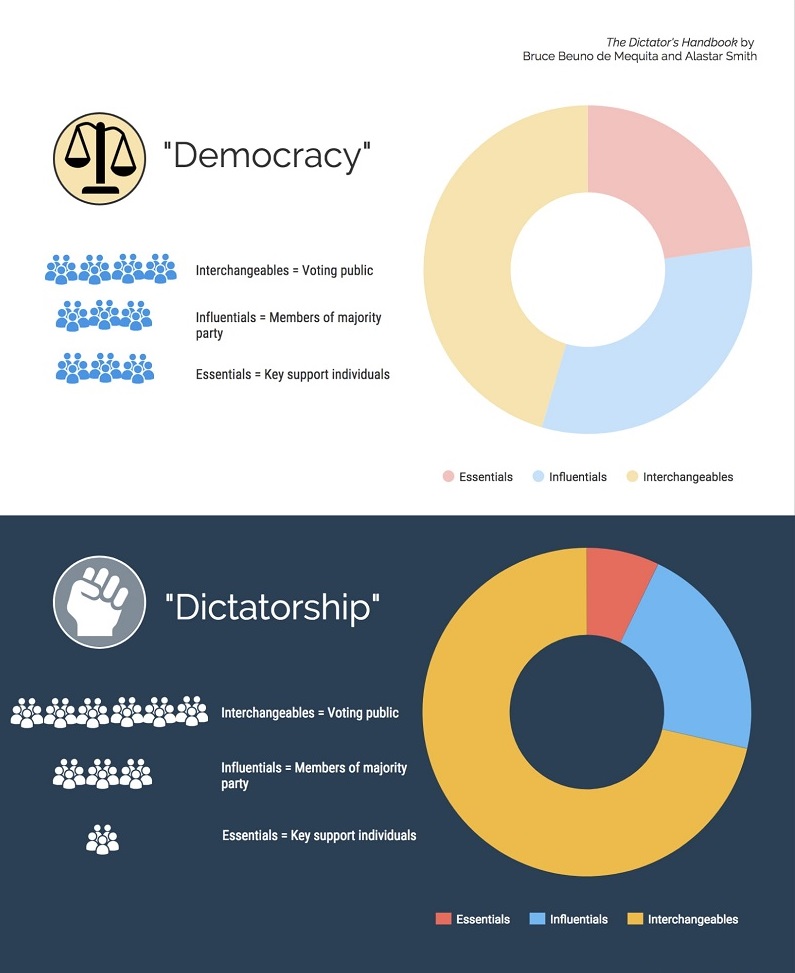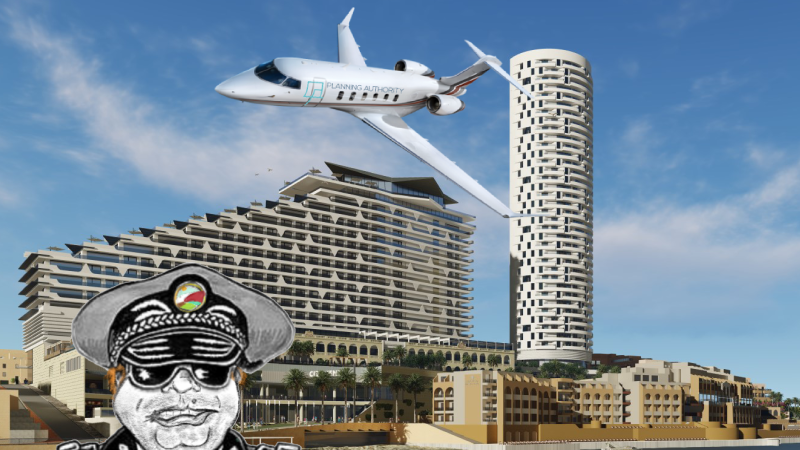Right, you have decided you want to be a ruler, you know that national interest and the common good are of no real consequence to you and you have by now decided how you are going to manage your three political dimensions (your interchangeables, influentials and essentials).
What’s next? What you need to figure out before you even get to power is how many people you need to keep loyal in order to stay in power, and how to go about doing this? You got it – you need money; and money, unsurprisingly, forms an integral part of how politics works.
Whether you are a democrat or a tyrant, your backers need to be sure they will be rewarded, not just upon coming to power but also in the long run.
You will also need to sort out those most likely to stay loyal to you from the opportunists who might be easily persuaded to abandon you. After that, you will need to reassure these key backers that they will always be better off under your government than under an alternative leadership.
What leaders do with the money they generate goes some way to defining what kind of leaders they are. They could use it to protect the personal wellbeing of all citizens or they could use it to buy the loyalty of a few key cronies, promote – directly or indirectly – corruption and black marketeering at the expense of the larger tax paying public.
Now that you know how important money is, here are the five essential rules that, according to authors Bruce Bueno de Mesquita and Alastair Smith, are what you need to succeed in any system:
Rule 1: Keep your winning coalition (essentials) as small as possible.
The smaller the group of people you need to rely on, the more control you have on power and more importantly, on expenditure.
Rule 2: Keep your nominal selectorate (interchangeables) as large as possible.
In doing so, you can easily replace any troublemakers in your coalition (essentials and influentials alike) . That way you will ensure you always have a large pool of substitute supporters waiting in line to gorge at the public trough that reminds your influentials and essentials to behave and stay loyal or else be replaced.
Rule 3: Control the flow of revenue
It is always more convenient for a ruler to determine who eats rather than have a large cake from which everyone can feed themselves. The best kind of revenue control is one that makes people poor while redistributing wealth to key backers.
Rule 4: Pay your key supporters just enough to keep them loyal
Of course most of your backers would rather be you than be dependent on you. Your key advantage lies in the fact that you know where the money is. Your key supporters need just enough to stop them from turning their gaze onto someone else.
Rule 5: Don’t take money out of your supporters’ pockets to better the condition of the general public
Despite rule number four, you can’t be too stingy towards your coalition of supporters. If you’re good to the public at the expense of your inner circle, it won’t be long before your ‘friends’ defect or begin plotting to rid themselves of you.
By now you’re probably thinking ‘Come on, surely these rules cannot be applied in a democracy. Moreover, in Malta we don’t pay high taxes and we are not poor. In fact our economy is doing amazingly well’.
True, most democratic leaders will find following these rules far more difficult to follow but that doesn’t mean they don’t try to follow them – it’s just that they are bound by different constraints such as the State’s laws and electoral procedures. Nothing that a little creativity cannot solve and, boy, have we been getting creative in Malta.
Let’s look at these rules in light of what happens on our ever ‘democratic’ isle.
Why have the government and opposition unanimously approved the lowering of the voting age to 16? Sure, Education minister Evarist Bartolo can say it would strengthen the electoral system but we now know the real reason; Rule 2 – Keep your nominal selectorate as large as possible.
Why do we know so little about Malta’s sale for passports scheme? Why does the government still refuse to publish the full Electrogas and Vitals contracts? Why is the Prime Minister promoting the IIP Citizenship Programme and not a senior employee from Identity Malta? Rule 3 – Control the flow of revenue.
As soon as he was elected to Office, Prime Minister Joseph Muscat realised that many influential supporters needed rewarding. He settled his dues with the PN turncoats and opportunists, then proceeded to systematically reward financially all those who helped bring him to power.
These rewards took many forms, Chairmanship of MCST, Law Commissioner with a few perks thrown in, promotions to the judicial bench, employing an unprecedented number of ‘persons of trust’ on the State payroll (many legal experts believe that all these positions, which bypass the Public Service Commission, are illegal but are, for reasons which cannot be examined here, difficult to challenge in a court of law) and additional chairmanships to round off parliamentary salaries.
The list is endless but it fits the description of Rule 4 – Pay your key supporters enough to keep them loyal.
Aha – you see, in Malta the key supporters are many because we are a ‘democracy’. You’re right. Almost. Malta’s size has allowed for a little reinterpretation of these rules. Can the above rather large and costly group of individuals be considered the Prime Minister’s key supporters? Not quite.
You may be forgiven for thinking that the hundreds of individuals who were rewarded in some way or other after helping Muscat get to power are his most important group but overall, they still remain his influential group. Joseph Muscat’s KEY supporters (essentials) we now know aimed at a lot more than a chairmanship or a lousy car with driver.

Those individuals are a mere handful and we all know their names. Rule 1- Keep your winning coalition as small as possible.
The economy is doing well. Sure, but can you honestly say your quality of life is better as you sit in traffic, observing the soulless buildings and cranes engulfing the island, as you inhale car fumes and the dust from construction debris or you wake up to a black cloud of toxic smoke from burnt waste just because in Malta there is an excess of everything material?
Will the new DB Group project enhance your daily experience? You can attribute this to Rule 5 – Don’t take money out of your supporter’s pockets to make the people’s lives better. No political party is going to upset the building developers by controlling what can and cannot be built.
No one is going to stop the sale for passports scheme, even if it is contributing towards a huge spike in property prices for local buyers (not to mention an unknown quantity when it comes to votes at elections). The Electrogas deal may have been a lousy one but it’s going to stay right where it is. The rest of you keep your €40 tax rebate and be grateful.
The promise of (more) money is too alluring. And as long as everyone in the current administration has been made aware of the potential that lies at the very top, everyone, including those we expected more, are going to bide their time and toe the Party line in the hope that one day, Muscat might deem them worthy enough to become part of his essential group.
Read more in the series: The Dictator’s Handbook
Source: The Dictator’s Handbook: Why bad behaviour is Almost Always Good Politics by Bueno de Mesquita and Alastair Smith.












